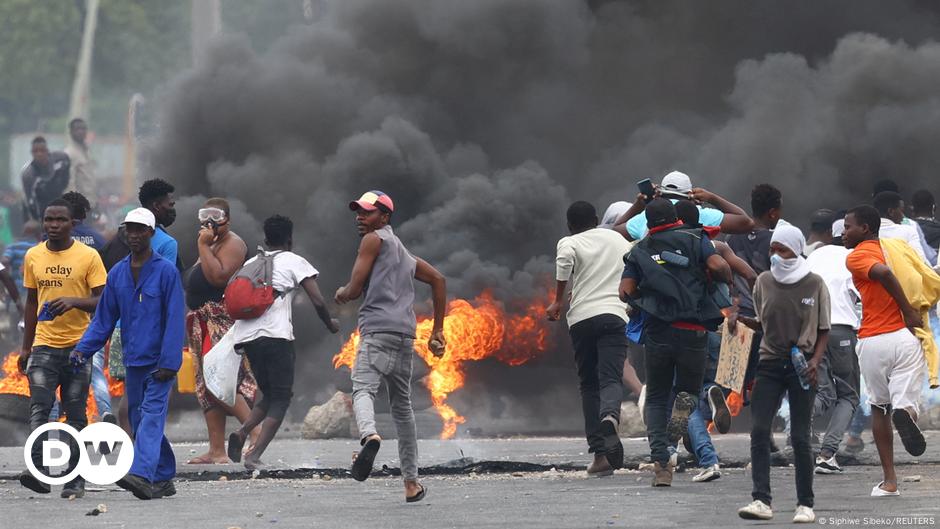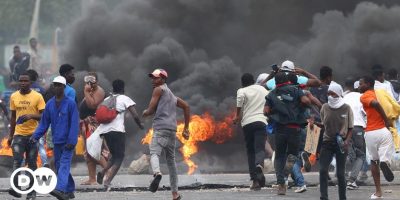Two South African journalists were released after they had been detained in Mozambique while reporting on anti-government protests, South Africa’s Foreign Ministry (DIRCO) said.
The Nigerian news outlet News Central TV released a statement earlier on Friday calling for the release of two of its journalists who went missing while in the Mozambican capital, Maputo.
Correspondent Bongani Siziba and cameraman Sbonelo Mkhasibe, from South Africa, were reporting for News Central TV when they were detained in unclear circumstances along with Mozambican journalist Charles Mangwiro, who was providing translation services.
Following her release, Siziba told News Central that she and Mkhasibe were blindfolded during their arrest.
“We were blindfolded the whole time. Imagine when you are blindfolded but you know around you are six guys holding guns. You don’t know your fate, what’s going to happen next.”
News Central, press freedom group slam detentions
Earlier on Friday, the News Central outlet condemned the detention of its journalists.
“The detention of our colleagues while performing their professional duties is deeply concerning,” said News Central editor-in-chief Kayode Akintemi in a statement, adding that attempts to establish communication with the journalists have so far been unsuccessful.
“We are working through all available diplomatic and official channels to secure their immediate release.”
Meanwhile, the Mozambique branch of the Media Institute of Southern Africa (MISA) demanded the “immediate and unconditional release” of the trio as well as a “full and transparent explanation” of their disappearance.
“The practice of journalism, including in Mozambique, is not a crime and journalists should not be victims of kidnapping or detention,” it said.
The detentions came just a day after two other Mozambican journalists were reportedly attacked with sticks in the northern city of Nampula.
According to MISA, César Rafael and Valdemiro Amisse from local broadcaster Rádio e Televisão Encontro were assaulted on Wednesday after filming the aftermath of violent clashes in the city.
Local newspaper Ikweli reported that police had opened fire on protesters in the Nampula suburb of Namicopo, killing two people.
Mozambique: Fresh protests over disputed election result
At least 30 killed in Mozambique election protests
According to Human Rights Watch, at least 30 people have been killed in a police crackdown on protests since the ruling Frelimo party claimed a landslide victory in elections on October 9, extending its 49-year rule stretching back to independence from Portugal in 1975.
More than 56% of Mozambique’s 17 million eligible voters abstained, while independent opposition candidate Venancio Mondlane has claimed the vote was rigged and encouraged demonstrations.
Mondlane himself was caught up in violence in October when police fired tear gas into crowds as he was speaking to journalists on the streets of Maputo, close to the spot where his lawyer and a senior opposition party official had been killed by unidentified gunmen two days before.
Earlier in November, two Portuguese journalists were expelled from Mozambique on the pretense of only having tourist visas rather than work visas.
In its statement, MISA said it is “concerned about the escalation of attacks against journalists involved in covering the ongoing demonstrations, carried out mainly by the Mozambican authorities, particularly the police.”
It added: “We cannot allow Mozambique to continue on this regressive path of denial of fundamental freedoms.”
Post-election turmoil grows in Mozambique
Mozambique: internet shutdowns and border closures
Meanwhile, digital rights groups in Mozambique say that there have been at least five mobile internet shutdowns since October 25, as well as social media shutdowns lasting several hours at a time.
On Friday, Mondlane supporters blocked traffic at Mozambique’s key Ressano Garcia border crossing, causing dozens of trucks headed for South Africa to come to a standstill.
On the other side of the border, South Africa’s Border Management Authority (BMA) confirmed it had closed its Lebombo border post due to the “continuing and intensified protest.”
Mozambique’s deep-water ports at nearby Maputo and Matola are vital for South Africa, which exports more than 50% of its chrome ore and concentrate through the Mozambican capital.
South Africa’s freight and rail association has estimated that each day the border is closed costs the South African economy at least 10 million rand ($550,000, €520,000).
mf/ab (AFP, Reuters, AP)


















